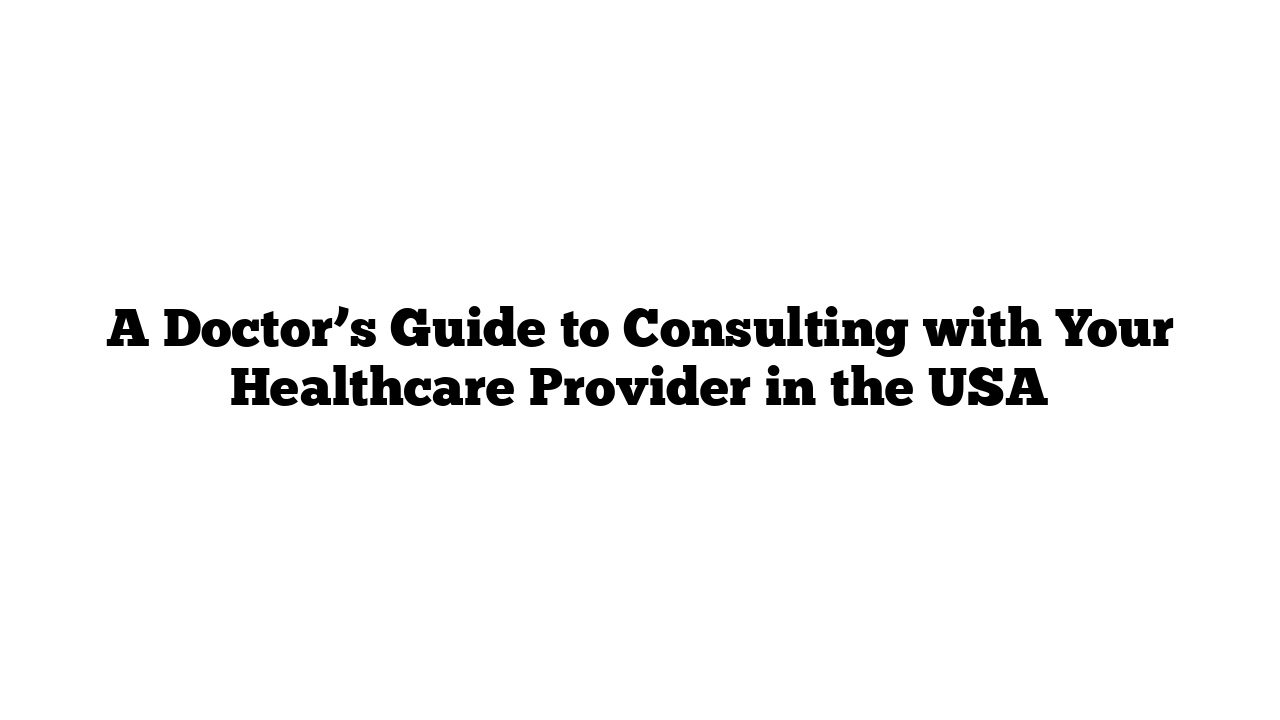Consulting with your healthcare provider is an important part of maintaining your overall health and well-being. Whether you’re seeking advice for a routine check-up or addressing specific concerns, knowing how to approach your doctor effectively can make a significant difference in your care. Here’s a detailed guide on how to consult with your healthcare provider in the USA.
Why It’s Important to Consult with Your Healthcare Provider
Your healthcare provider is there to help you manage your health, prevent diseases, and provide guidance on maintaining a healthy lifestyle. Consulting them regularly can:
- Detect early signs of health issues
- Offer expert advice on treatments and medications
- Provide preventive care to avoid serious illnesses
By understanding how to approach these consultations, you’ll ensure you get the most out of your healthcare experience.
Preparing for Your Visit
Preparation is key to having a productive conversation with your healthcare provider. Here are some steps to consider before your visit:
- Write Down Your Symptoms
If you’re visiting for a specific health concern, it’s essential to note down your symptoms. Include details like when they started, how severe they are, and whether they have changed over time. - List Your Medications
Bring a list of any medications, including vitamins or supplements, that you are currently taking. This helps your provider understand your medical history and avoid any potential interactions. - Ask About Your Family Medical History
If you know of any hereditary health conditions in your family (e.g., heart disease, diabetes, etc.), let your healthcare provider know. This information is essential for understanding your risks. - Prepare Questions
Write down any questions you have. These could be about a diagnosis, treatment options, side effects of medications, or lifestyle changes that could improve your health.
During Your Appointment
Now that you’re prepared, it’s time to have a productive conversation with your healthcare provider. Here’s how to make the most of your appointment:
- Be Honest and Open
Share all your symptoms, habits, and lifestyle choices with your doctor, even if some of them seem embarrassing. Honesty will allow them to give you the best advice possible. - Take Notes
During the visit, take notes or ask for written instructions. This helps you remember important details, such as medication dosages or follow-up steps, later on. - Don’t Hesitate to Ask Questions
If something is unclear, ask your doctor to explain it again. It’s essential to fully understand your health situation and the steps you need to take moving forward. - Discuss Treatment Options
Talk about all available treatment options, including their benefits and risks. This will help you make informed decisions about your health.
After the Visit: Follow-up and Ongoing Care
Once the appointment is over, follow the instructions provided by your healthcare provider. Here’s what to keep in mind:
- Follow-up Appointments
If your doctor recommends a follow-up visit or test, make sure to schedule it as soon as possible. Staying on top of follow-ups ensures that any changes in your health are monitored closely. - Medication and Lifestyle Changes
Stick to the prescribed medications and lifestyle changes your doctor has suggested. If you have any questions or side effects, reach out to your healthcare provider immediately. - Keep a Health Journal
To track your progress, consider keeping a health journal. Write down any changes in your symptoms or reactions to medications. This can help you and your healthcare provider monitor your health over time.
When to Seek a Second Opinion
Sometimes, it’s beneficial to seek a second opinion, especially if you feel unsure about your diagnosis or treatment plan. In the USA, you have the right to consult another healthcare provider for confirmation, especially for serious or complex conditions.
If you are ever in doubt about the advice you’re given, don’t hesitate to ask for a second opinion. It can provide peace of mind and ensure you’re making the best decisions for your health.
Final Thoughts: Your Health, Your Choice
Consulting with your healthcare provider is an ongoing process. By preparing for your appointments, being open during your visits, and following through with your care plan, you can ensure that you’re making the most of your healthcare experience.
For more tips and expert advice on health-related topics, visit medicaltimes.io.
